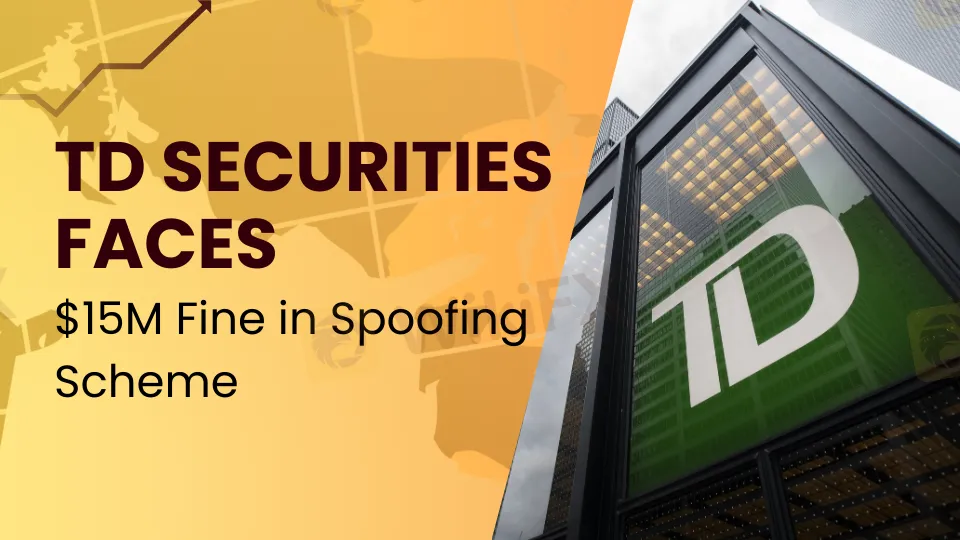简体中文
繁體中文
English
Pусский
日本語
ภาษาไทย
Tiếng Việt
Bahasa Indonesia
Español
हिन्दी
Filippiiniläinen
Français
Deutsch
Português
Türkçe
한국어
العربية
TD Securities Faces $15M Fine in Spoofing Scheme
Abstract:TD Securities was fined $15M for manipulating the U.S. Treasury market through an illegal spoofing strategy. SEC and DOJ impose penalties for broker-dealer failures.

SEC Charges TD Securities for Market Manipulation
The Securities and Exchange Commission (SEC) has issued major charges against TD Securities (USA) LLC for fraudulent trading activities in the US Treasury cash securities market. The registered broker-dealer was discovered to have utilized an unlawful trading practice known as spoofing, which is putting non-bona fide orders with no intention of execution to influence market prices.
Between April 2018 and May 2019, a trader at TD Securities reportedly engaged in hundreds of fake transactions, disrupting the market and resulting in huge gains for the business. The SEC's inquiry revealed that the trader who supervised the US Treasuries trading desk purposefully misled the market by canceling these non-bona fide orders after obtaining favorable pricing for real transactions.
Supervision Failures and Lack of Control
Along with the accusations of market manipulation, the SEC has emphasized TD Securities' inability to supervise its traders effectively. Despite internal warnings about abnormal trading activity, the business did not take adequate steps to investigate or prevent future misbehavior. This broker-dealer supervisory violation has serious regulatory ramifications.

Mark Cave, Associate Director of the SEC's Division of Enforcement, underlined the need for strong regulation in financial institutions. “Manipulative trading undermines trust in our markets. Firms cannot disregard their workers' unethical behavior. This action demonstrates our commitment to combating illegal trading schemes,” Cave said.
Penalties imposed by SEC, DOJ, and FINRA
TD Securities has agreed to resolve the accusations and pay a $15 million fine issued by the SEC, DOJ, and FINRA. This penalty consists of $400,000 in disgorgement, a $6.5 million civil penalty, and a corresponding $6 million punishment from FINRA.
As part of a deferred prosecution deal with the Department of Justice, TD Securities admitted to violating the antifraud provisions of US securities laws. The company has been urged to refrain from additional offenses and chastised for its insufficient internal controls.
Related News:
Broader Impact on Financial Institutions
The SEC's lawsuit against TD Securities demonstrates the increasing regulatory attention on combating unlawful trading methods such as spoofing. Regulatory and compliance officials at financial institutions, especially those in large financial centers such as New York and Washington, D.C., are reminded of the crucial necessity for strong supervision procedures. Failure to effectively supervise trading desks may lead to serious financial and legal implications.
The fines issued are a strong signal to corporations participating in the US Treasury securities markets. Financial professionals, notably brokers, traders, and investors, must be diligent in maintaining ethical trading practices to maintain market integrity.
Stay informed on the latest developments regarding TD Securities and market manipulation. For more insights, visit the TD Securities page on WikiFX now!

Disclaimer:
The views in this article only represent the author's personal views, and do not constitute investment advice on this platform. This platform does not guarantee the accuracy, completeness and timeliness of the information in the article, and will not be liable for any loss caused by the use of or reliance on the information in the article.
Read more

Anti-Scam Groups Urge Tougher Action on Fraudsters in UK
Anti-scam groups demand tougher police action on fraudsters as UK fraud rates surge 19%, targeting millions in a penalty-free crime spree exposed by a $35m scam leak.

Philippines Deports 29 Indonesians Linked to Online Scam Syndicate in Manila
Online scam groups in the Philippines trick Filipinos into gambling and love scams, from Manila to Bacolod, causing trafficking and pain as police fight back.

Why does your mood hinder you from getting the maximum return from an investment?
Investment decisions are rarely made in a vacuum. Aside from the objective data and market trends, our emotions—and our overall mood—play a crucial role in shaping our financial outcomes. Whether you’re feeling overconfident after a win or anxious after a loss, these emotional states can skew your decision-making process, ultimately affecting your investment returns.

How Reliable Are AI Forex Trading Signals From Regulated Brokers?
Discover how reliable AI Forex trading signals are and why using a regulated broker boosts their effectiveness. Learn key factors to evaluate accuracy and enhance your trading.
WikiFX Broker
Latest News
How Crypto Trading Transforms FX and CFD Brokerage Industry
UK would not hesitate to retaliate against US tariffs - No 10 sources
FCA Warns Against 10 Unlicensed or Clone Firms
CySEC Warns Against 14 Unlicensed Investment Websites
Top Currency Pairs to Watch for Profit This Week - March 31, 2025
Will natural disasters have an impact on the forex market?
Philippines Deports 29 Indonesians Linked to Online Scam Syndicate in Manila
Navigating the Intersection of Forex Markets, AI Technology, and Fintech
Exposed: Deceptive World of Fake Trading Gurus – Don’t Get Fooled!
AI-Powered Strategies to Improve Profits in Forex Trading
Currency Calculator








